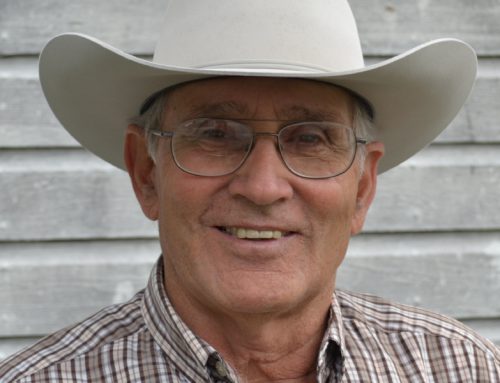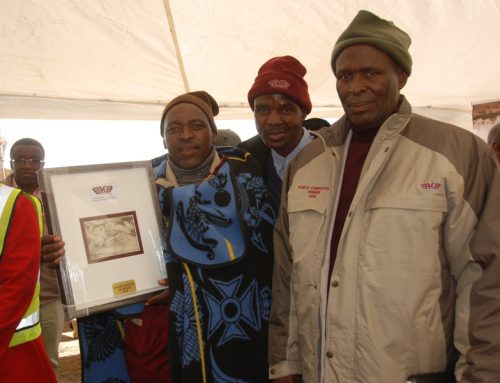Memories of his younger farming years must have come flooding back to 87-year-old Chipper Kingwill as he sat in the stands watching the Jubilee Sheepdog Trials in Graaff-Reinet on the 6th and 7th of May.
Fifty years ago Chipper was one of the founder members of the South African Sheepdog Association (SASDA). Several of his fellow founder members have since gone farming in the heavens, but he fondly remembers them all and talks about their founding meeting at Union High School in Graaff-Reinet.
“After the Second World War the Karoo farmers started talking about the tremendous amount of labour in dogs that could be unlocked. This would save on farm labourers as money was tight,” Chipper recalled. “To this end a group of us got together in the Standard 9 classroom at Union High, which has been made available to us for our meeting, and formed the South African Sheepdog Association in 1961.”
They drew up a constitution with the aim of ‘promoting sheep dogs to all farmers and to form local clubs in different districts so that all farmers could witness the ability of these working dogs’.
The first sheepdog trials were held in Graaff-Reinet that year, and won by farmer Billy Kingwill with ‘Tess’.
BRINGING BORDER COLLIES TO SOUTH AFRICA
There weren’t many working sheepdogs available in South Africa at the time – the most popular being the Border Collie which originates from the border of Scotland and England, hence its name. To increase the gene pool and number of working sheepdogs in South Africa, SASDA raised sponsorship for shepherds/handlers and farmers from the United Kingdom to come to South Africa with their dogs, demonstrate their ability, participate in SASDA’s early trials and sell their dogs to South African farmers.
Between 1960 and 1990 Chipper imported 11 sheepdogs mostly from Scotland.
“I thought I was taking on the dogs but the dogs took me on,” he smiles. Chipper farmed in the Graaff-Reinet district until 1976 when he moved to Bredasdorp to farm with sheep and grain.
His all-time favourite dog was Maid with whom he won his second South African National Championship in 1983. The year before, Maid’s son Craig won the South African National Championship on three legs after his fourth had to be amputated due to an infection. Craig’s handler was Graaff-Reinet farmer Con Kingwill who passed away in January this year and was renowned for his uncanny understanding of the canine mind.
FIFTY YEARS LATER WORKING DOGS ARE NEEDED FOR THE SAME REASONS
Fifty years since that day in the Standard 9 classroom at Union High, the reason why more farmers are investing in working Border Collies has not changed.
With the labour laws and issues farmers face today, farmers who work their sheep with Border Collies concur that one or two dogs can do the work of four men.
TOP DOG ‘DON’
Top Dog on the first and second day of the Jubilee in Graaff-Reinet this year out of a field of 47 dogs was Don in first place and Jill in second place, both handled by leading South African Border Collie breeder, handler and sheep farmer Faansie Basson who lives in Swellendam.
Faansie has won the South African National Championship five times, Dog of the Year eight times and achieved international recognition at leading trials in the United States.
In 2009 at the prestigious Soldier Hollow International Sheepdog Championship in the United States, Faansie was placed second and third with Jill and Don – which made him the first competitor ever to make the medal stand with two dogs.
AMY AND THEA
In third place for Top Dog on the first day was Mark Trollip from Muldersdrift with Amy and in third place on the second day was Ragni Pretorius from Mooi River with Thea.
Ragni and her sister Ingrid Fricke run their sheep farm in Mooi River without any labour other than their Border Collies. Ragni has also trained Border Collies to herd cattle as her husband ran a dairy on the farm when he was alive.
“I would start them on weaners to build up the dogs’ confidence. At the same time it got the weaners accustomed to being herded, which meant as they grew into adults they were accustomed to the dogs,” she explained.
Of the 17 handlers competing in the Graaff-Reinet event this year, at least half were women, including the 2010 South African National Champion, Elsie Jammy from Muldersdrift with Bles.
PASSIONATE ABOUT WORKING DOGS
“What I love about these events is the opportunity to get together with other handlers and breeders who are as passionate about working dogs as I am,” said Elsie whose approach to entering the trials is: “I anticipate nothing and hope for the best. And when I do get the cherry on the top it’s wonderful.”
The dogs have to complete several tasks, including the outrun, driving and shedding the sheep, herding them through gates, loading them into a trailer and penning them…all in a matter of minutes.
“What we do in trialing is to go through what farmers do in their everyday work,” Elsie explained.
The young Angora goats being herded at the Graaff-Reinet event belonged to Angora farmer Billy Colborne who was also the commentator for the day. Four Angoras were fielded at a time to make things more difficult for the handlers as larger flocks are easier to herd. Angoras also pose an additional challenge “because they are more individualistic than sheep and tend to break ranks” Billy explained.
FLOCK MANAGEMENT WITH DOGS
Billy’s family has farmed with Angoras in the Willowmore district since 1888. “Management of our flocks – which range from 3000 – 5000 depending on conditions – is so much more intensive these days with all the predators and theft, and here the sheepdog plays a very important role,” said Billy who joined SASDA in the 1960s.
Billy, who is now 75 years of age, stopped trialing in the 1990s but remains committed to SASDA. He was presented with an award for his dedicated service to SADA at the Graaff-Reinet trials.
His all-time favourite dog was Nel with whom he won the South African National Championships and Dog of the Year in the 1980s. “She was the dog in my life. She and I just clicked,” he said.
Another trialing legend competing at Graaff-Reinet was 72-year-old sheep farmer and breeder Henry van der Merwe from Sutherland, who has been South African National Champion eight times.
“Farming is full of surprises and trialing helps you and your dog develop the precision and discipline to rise to the challenges on the farm,” he said.
AN EXTRAORDINARY LINEAGE
Watching these outstanding working dogs in action is a deeply moving experience. Their focus or ‘eye’, their intelligence, commitment and dedication to their handlers speaks of an extraordinary lineage and sport dating back to 1873 when the first ever sheepdog trials were held in Wales.
Central to the Border Collie lineage was a dog named Old Hemp, born in England in 1894. The story goes that most of the top working and trialing Border Collies worldwide today have Old Hemp’s blood somewhere in their line. He passed on remarkable mental and physical characteristics to his offspring and was widely sought after as a stud dog. In his lifetime he sired hundreds of sons and daughters. They proved to be superior workers and were bought by people from all over the world.
The South African National Championships will be held in Muldersdrift in late September this year when all the regional winners will compete. At this same event the Dog of the Year 2011 will be announced. The 2009 and 2010 winner was Don and he’s looking good for this year.
Sidebar: WHAT MAKES A GOOD WORKING SHEEPDOG
As a Border Collie breeder Faansie Basson strongly advocates good bloodlines, good genes and to buy from someone who works with their dogs every day.
“The best working dogs are bred from strong herding genes. The chances of your dog being a good worker with a good eye and good balance are considerably increased if they come from good herding stock,” he explains.
Basson starts work training his Border Collies from 10 months to a year. “Raising your pup is a very important part of the process and they should not be exposed to livestock too soon because they may get injured or have their confidence knocked. When you start the training sessions they need to be short and focused – from 10 to 20 minutes – for the first couple of weeks.”
With the right genes and proper training the dogs can develop into really good workers by the age of three.
Several recognised breeders are registered with the South African Sheepdog Association (SASDA), which maintains high standards for working dogs.





